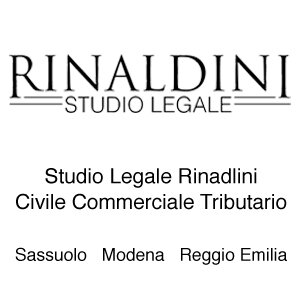Best Debt & Collection Lawyers in Sassuolo
Share your needs with us, get contacted by law firms.
Free. Takes 2 min.
List of the best lawyers in Sassuolo, Italy
About Debt & Collection Law in Sassuolo, Italy
Sassuolo is a town in the province of Modena, region Emilia-Romagna. Debt and collection matters that arise in Sassuolo are governed by national Italian law and handled through the courts and public offices that serve the Modena district. Key bodies involved include the Tribunale di Modena for civil claims and enforcement matters, the Conservatoria dei Registri Immobiliari for property registrations, and local offices that provide mediation and consumer assistance. Procedures you will commonly encounter include pre-litigation collection attempts, formal payment orders such as the decreto ingiuntivo, and enforcement actions such as pignoramento - attachment of assets - and insolvency or debt-restructuring proceedings for businesses and individuals.
Why You May Need a Lawyer
Debt and collection matters raise legal, financial and procedural issues that often require specialist advice. You may need a lawyer if:
- You have been notified of a formal payment order or a court claim and need to prepare a defence or opposition.
- A creditor is seeking enforcement through attachment of wages, bank accounts, or real estate.
- You believe a debt claim is incorrect, expired by prescription, or arises from fraud or usurious interest rates.
- You wish to negotiate an out-of-court settlement, payment plan, or debt restructuring agreement - including procedures under the law on over-indebtedness (Legge 3/2012) or corporate restructuring under the insolvency code.
- You are being harassed by debt collectors and want to enforce consumer protections under the Consumer Code.
- You need to assess options for bankruptcy, concordato, or other insolvency procedures for companies and self-employed persons.
An experienced lawyer will explain procedural steps, represent you before the Tribunale, draft or oppose a decreto ingiuntivo, request suspension of enforcement where possible, and negotiate acceptable solutions with creditors.
Local Laws Overview
The main legal framework affecting debt and collection in Sassuolo follows national Italian laws. Important elements to understand include:
- Civil obligations and remedies: The Codice Civile sets out contractual obligations, default interest, and general rules for claims and remedies.
- Enforcement and procedure: The Codice di Procedura Civile governs civil procedure, including the decreto ingiuntivo - an order for payment issued when a creditor has documentary proof - and execution proceedings such as pignoramento mobiliari, pignoramento immobiliare, and pignoramento presso terzi.
- Insolvency and debt restructuring: The national insolvency code and the Codice della crisi d'impresa e dell'insolvenza set rules for corporate insolvency, while Legge 3/2012 provides mechanisms for natural persons and small businesses to manage over-indebtedness through negotiated solutions and court-approved plans.
- Consumer protections: The Codice del Consumo protects consumers from abusive debt-collection practices, and criminal law addresses illegal conduct such as usury or threats. The state publishes reference interest rates and thresholds that determine when interest may be considered usurious.
- Statute of limitations and prescription: Civil claims are subject to prescription periods under the Codice Civile. The duration varies by type of claim, and interruption or suspension of prescription may occur under certain acts by creditors.
- Administrative and registration formalities: Property seizures and mortgages are registered at the Conservatoria dei Registri Immobiliari, which is typically handled through the Modena office for Sassuolo matters. Official notices from companies and public bodies may be served by registered post or by PEC - posta elettronica certificata - where applicable.
Frequently Asked Questions
What is a decreto ingiuntivo and how does it work?
A decreto ingiuntivo is a formal order for payment that a creditor can request from the court when they hold written proof of a debt. If the court issues the order and the debtor does not oppose it within the statutory time, the creditor can convert it into an enforceable title and begin execution actions such as attachment of assets.
Can a creditor seize my salary or bank account in Sassuolo?
Yes. After obtaining an enforceable title, a creditor can pursue pignoramento presso terzi to seize wages or bank funds. Protections exist for minimum subsistence amounts and certain income types, and limits apply to how much of a salary may be taken. You should get legal advice promptly to explore exemptions or to request suspension.
How long does a creditor have to bring a claim - what about prescription?
Claims are subject to times limits - prescription - under the Codice Civile. The general statute is ten years for many contractual claims, but different claims may have shorter periods. Prescription can be interrupted by actions such as a formal demand or a court filing. Consult a lawyer to confirm the applicable term for your specific debt.
What can I do if I think the debt is wrong or inflated?
If you dispute a debt, do not ignore formal notices. Gather contracts, invoices, payment proofs and communications, and seek legal advice. You can oppose a decreto ingiuntivo, request accounting and documentation from the creditor, and raise defenses such as lack of cause, payments already made, or prescription.
Are there protections against aggressive or unlawful debt collection?
Yes. The Consumer Code and criminal laws prohibit harassment, threats and unlawful conduct by debt collectors. If a collector uses abusive practices or demands usurious interest, you can report the conduct to the police, the Procura della Repubblica, or seek civil remedies. Keep records of calls and messages and consult a lawyer or consumer association.
What options exist for someone who is over-indebted and cannot pay?
Italy provides solutions for over-indebted natural persons and small traders under Legge 3/2012. Options may include negotiated compositions, debt settlements approved by a court, or payment plans. Insolvent companies have separate procedures under the insolvency code. A lawyer or debt counsellor can assess eligibility and begin the appropriate procedure.
Can a foreign creditor collect a debt against someone in Sassuolo?
Yes. Foreign judgments and titles may be enforced in Italy if they meet the recognition and enforcement rules under Italian law and applicable EU or international conventions. The process varies depending on whether the creditor comes from another EU country or outside the EU. Legal assistance is essential for cross-border enforcement.
What documents and information should I bring to an initial meeting with a lawyer?
Bring identification, all communications with the creditor, contracts, invoices, receipts of payments, bank statements showing relevant transactions, any court papers received, and a timeline of events. Clear documentation speeds assessment and allows the lawyer to advise on prescription, defenses and settlement options.
Can I reach a settlement out of court, and how is that enforced?
Yes. Many disputes end with out-of-court settlements such as payment plans, debt forgiveness or composition agreements. These can be formalised in writing and, if necessary, made enforceable by filing with the court or by obtaining a court approval. A lawyer can draft terms, negotiate with creditors and ensure legal enforceability.
Is legal aid available if I cannot afford a lawyer in Sassuolo?
Yes. Italy offers gratuito patrocinio - legal aid - to eligible low-income individuals for civil matters, including many debt-related cases. Eligibility is based on income and other factors. The Ordine degli Avvocati di Modena and local legal aid offices can provide guidance on applying for legal aid and finding a lawyer who accepts legal aid clients.
Additional Resources
Here are local and national resources that can help you find information or assistance:
- Tribunale di Modena - the civil court that handles claims and enforcement for Sassuolo matters.
- Conservatoria dei Registri Immobiliari - for questions about property registration and mortgages in the Modena district.
- Ordine degli Avvocati di Modena - the local bar association that can provide directories of qualified lawyers and information about legal aid.
- Consumer associations - organisations that assist consumers with disputes and provide guidance on unfair practices and debt-collection conduct.
- Procura della Repubblica and local police - for reporting criminal conduct such as threats or suspected usury.
- Bank of Italy and Ministry of Economy - publish reference interest rates and thresholds relevant for claims of usury or excessive interest.
- Registered mediation bodies and debt counsellors - for out-of-court dispute resolution and assisted negotiation services.
Next Steps
If you need legal assistance for debt or collection matters in Sassuolo, follow these practical steps:
- Do not ignore formal notifications. Read any letters or court papers carefully and note deadlines.
- Gather and organise all relevant documents - contracts, invoices, receipts, bank statements and written communications. Create a clear timeline of events.
- Contact a local lawyer experienced in debt collection and enforcement. Request an initial consultation to review your case, possible defenses and options for settlement or restructuring.
- Ask about legal aid if your income is low. The Ordine degli Avvocati di Modena can advise on eligibility and help you locate lawyers who accept legal aid cases.
- Consider alternatives to litigation such as negotiation, mediation or an out-of-court agreement to avoid costs and lengthy proceedings.
- If enforcement actions are already underway, seek immediate legal advice to explore injunctions, exemptions or protective measures that can limit seizure of assets or wages.
- Keep detailed records of all communications with creditors and collectors, including dates, times and content of calls and messages.
Acting promptly and with accurate information increases your chances of a favourable outcome. A qualified local lawyer will explain the best path according to your circumstances and protect your rights throughout the process.
Lawzana helps you find the best lawyers and law firms in Sassuolo through a curated and pre-screened list of qualified legal professionals. Our platform offers rankings and detailed profiles of attorneys and law firms, allowing you to compare based on practice areas, including Debt & Collection, experience, and client feedback.
Each profile includes a description of the firm's areas of practice, client reviews, team members and partners, year of establishment, spoken languages, office locations, contact information, social media presence, and any published articles or resources. Most firms on our platform speak English and are experienced in both local and international legal matters.
Get a quote from top-rated law firms in Sassuolo, Italy — quickly, securely, and without unnecessary hassle.
Disclaimer:
The information provided on this page is for general informational purposes only and does not constitute legal advice. While we strive to ensure the accuracy and relevance of the content, legal information may change over time, and interpretations of the law can vary. You should always consult with a qualified legal professional for advice specific to your situation.
We disclaim all liability for actions taken or not taken based on the content of this page. If you believe any information is incorrect or outdated, please contact us, and we will review and update it where appropriate.









